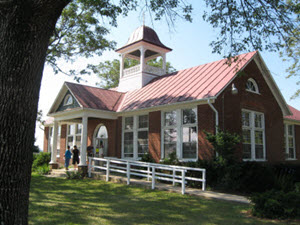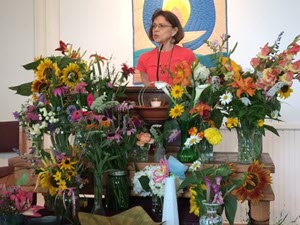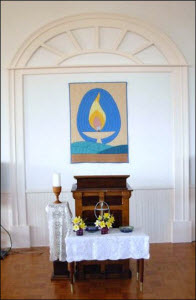
HUU Sermon Archives
My Spiritual Journey
by Claire Prideaux
Date: January 30, 2005
Having been asked to share my spiritual journey, I sat, fingers poised above my laptop, to compose a plan for my talk. Then, I woke up to the fact that our spiritual journeys are not like well-planned summer vacations subject to brief recitations—at least not if we hope to share something of meaning; they are instead joined at the hip and heart our life’s journey. John Lennon once observed, “Life is what happens when we are busy making other plans,” and because our individual lives have a haphazard way about them, I gave up on planning and decided instead to write about my spiritual journey in the same way I have lived my life, by diving in.
My mother grew up Anglican in the sectarian strife of Northern Ireland and my father’s evangelical upbringing left him with the memory of his mother throwing rent money at tent revivalists. Because of their early experiences, neither held lofty thoughts about the virtues of organized religion nor were they fans of ostentatious displays of religiosity. To satisfy my mother’s early indoctrination, however, I was baptized by the first available naval Chaplain, and that is how I became ostensibly a Methodist.
Although personally freed from the desire, if not the need, to attend church, my parents, like many others before and since, thought Sunday school was the best way for their youngsters to learn the basics of Christianity. Sunday school, however, was overshadowed by early morning fights with my mother, brought about by my steadfast refusal to eat lumpy oatmeal. Oatmeal and church seemed to go hand in hand because when the oatmeal stopped, so did Sunday school. And all I was left with was a vague memory of the story of Noah’s arc told on a felt story board, and the bewilderment that accompanied being forced to run in a three-legged race at the church’s spring picnic for the amusement of big people.
Both my parents, to my child’s way of thinking, seemed to have a strong faith in God, and so with a semblance of sanity restored, and Sunday school in my rearview mirror, my parents went about instructing me according to their own beliefs, making sure I loved God, said my prayers at night, and could correctly identify the baby Jesus in a nativity scene.
Not wanting to admit defeat in getting others to share in my religious instruction, the summer after 1st grade mother enrolled me in Vacation Bible School, perhaps because no oatmeal was involved. She didn’t bargain, however, for the couple who would volunteer to take me to church each Sunday once school started back up or for the need for decent Sunday school clothes on poverty wages. Nor did she have much experience with the Baptists. And after my becoming increasingly agitated about being told I was a sinner and bound for hell if not for glory, mother agreed to tell the nice couple that I would be attending another church, and so I did…sort of.
Thus began my mother’s own personal crusade to allow every door-to-door evangelist to grace our threshold and instruct my brother and me in the basics of faith. Once settled comfortably in our living room, our visitors’ initial spiel would be met by mother’s probing questions, and the unsuspecting evangelists, thinking that they had live ones on the line, would provide the schooling. After our visitors left mother would ask, “How do their beliefs compare to what you believe and your own religion?” Although I could have asked her “What religion,” I did not. If religion has anything to do with life lessons, I had already learned not to knowingly irk my mother.
When we weren’t being home schooled by the evangelists, we were attending various Catholic churches with mother’s friends. On the side, mother would instruct me as to the finer distinctions between what Catholics and what people from her religion believe. I concluded that there was little difference, save the Pope.
Spring, 3rd grade, one afternoon, after my mish mash of religious schooling, I was praying earnestly to Jesus. Somehow I had gotten the idea that Jesus was an intermediary for God—already I was rejecting the idea of Jesus as God—, and in the middle of this prayer—truly I must have had Jesus mixed up with the Blessed Virgin—I was impressed by the utter ridiculousness of praying to Jesus for the ear of God. So in that I moment I decided to return to my old practice of praying to God directly.
Now I knew what Jesus looked like; I’d seen his picture at church. But God? The image my little brain dredged up to supplant Jesus in my mind was a fellow who looked suspiciously like Father Time. Wait! God didn’t look like Father Time. Looking past the artifice of the kindly or wrathful “God the Father,” if you were still attending that Baptist church I had deserted, I knew God didn’t look like anything in particular.
You see, I knew God already; God and me, we had an ongoing relationship (and I thought that that was true with everyone). But lately I had been having my mind stuffed with a bunch of bunk (from the same big people who had foisted 3-legged races upon me) that put people, particularly people of authority, and guilt and duty, and some more guilt, between me and God.
When I rejected the white-haired man that had crept into my imagination and God as a supernatural being, I thought I was doing what I was supposed to be doing. It appeared to me that big people, thinking it was good for me, had purposefully planted a developmental stepping stone in my path, which, when traversed, would require me to pretend like everyone else that I had not. All this pretending was to be done for the benefit of the little ones who couldn’t possibly relate to such a big idea—it was a grownup conspiracy, like the deal with Santa Claus. I figured I must be right about the need to pretend about a belief in a personal God because whenever I tried to talk to my mother about my God experiences, she would tell me I had a terrific imagination, and so I stopped talking about them.
My personal knowledge of God had come via mystical experiences, which were, in my way of seeing, simply another view of every day life. Because God could be seen in a sunset, the rocks growing up in the field behind my home, the nature of a spider, the cadence of a nursery rhyme, the taste of peas, the dead little sparrow at the base of a tree, the smell of laundry when it came in off the line, the feel of a mud cake—and yes, even in the nasty lumps in my oatmeal—, I knew that God could not be gift wrapped.
To capture my attention, however, God could be theatrical, over the top. I remembered such a time: I was four, playing hide and seek with neighborhood children in the hills behind where my Aunt lived in Peebles, Scotland. As the other children ran off to find hiding places, I stayed behind and hid in an old, ramshackle potting shed, and while I was tucked away in the shed, the sun came out. Light pierced a gap in the wood just so, and a sunbeam invited me to experience the nature of God’s grace. In what may have been an instant, a river of time flooded my being, and long ago wayfarers flowed through me as they wended their way through the very spot where I was gently planted. I was enthralled and filled with a deep nostalgia for the present moment—a mixture of gratitude and longing—, an emotion which seemed to embody the eternal now of all who had come before me. When the parade passed, I was overcome by an ineffable sense of bliss, and it no longer mattered whether I joined the other children.
By the age of 12, under the influence of my steady stream of Catholic friends, I was seriously thinking of becoming a nun, not to become the Bride of Christ, mind you, but to serve God. Credit to my mother, her only question was “Can you cope with a pope?” And so I joined the new Methodist church that was forming within walking distance of my home, gravely disappointed that my brilliant career as a nun was not to be.
At 13, a classmate, who may have seen me as a sinner ripe for picking, invited me to attend his church-sponsored revival, which is how I came to be officially saved. By that time, I was already translating reverence language; unfortunately, having also been chock-filled with enough guilt by my protestant Irish mother, my lessons in Catholicism, and my short stint with the Baptists, I could with full conviction relate to the preacher’s call to repent my sins and give my life over to Jesus. Jesus was a great guy after all, and if giving my life over to him meant that I could serve God, then I was all for it; until, that is, the church workers set about to convince me to leave my Methodist church for their Baptist one. Once bitten, twice shy; lesson well learned.
By the time I was 15, I had discovered, much to my surprise, that this Christianity thing wasn’t some big metaphor for many adults. Lots of adults really did believe in a personal God and also that Jesus IS God, not just a child of the universe like me, and even those who didn’t, still talked as if they did even when no children were about. Suddenly, I felt out of step with my fellow church-going Methodists and was left wondering what, if anything, I should do about it. Then one day, I had a vision.
Jesus’ name had been invoked for the umpteenth time by the minister when the doors to the sanctuary flew open and Jesus himself entered. He strode down the isle as if he owned the place, knocking aside the only representation of him in the sanctuary—this was, after all, a Methodist church. Interrupting the service, Jesus turned to the congregation and with passion said, “It’s about the message NOT the messenger!”
With that vision, and my rejection of dogma deemed important to Christianity, I left the Christian church.
Noting that life had thus far been a great and sometimes glorious teacher, I decided to let life itself teach me what I needed to know about living a spiritually directed life. I purposely set out to experience God first hand without the filter of other people’s writing or dogmatic views about religion, and so I eschewed all religious programming and services except for funerals and weddings (because it was socially unacceptable to boycott these observances) and of course, Christmas Eve service. No need to throw baby Jesus out with the bathwater. I had a certain faith that what I needed to know in life would be brought to me by the people and experiences I encountered.
At 37, parched and disoriented, stuffed to the gills with three years of dry, secular law schooling and little connection to the mainstream of life, I decided it was time to end my sabbatical from second-hand religious experience. As I raced to quench my thirst by diving into books about religion and spirituality with a passion, I discovered that the confluence of my life experiences had merged into a personal, fluid philosophy, which resembled the mingling together of Taoism, Zen, and Jesus’ message. To my delight, there was a reason why some of my clients in a social program I had once directed referred to the program as “The Church of the Here and Now.” Shortly thereafter, I joined this congregation to fulfill one of the components of that living, sacred human trinity of self, family, and community.
When I was younger, just out of college and determined to escape poverty, I railed at God when I felt pulled by my heart to abandon my materialist leanings. “But I don’t want to be another Mother Teresa,” I yelled. “I want to be middle class. No vow of poverty for me!” Since that time—that is, until recently—I’ve been stubbornly trying to serve God while also attempting to make a fairly decent living, my law school venture had been part of that plan. With my most recent achievement—joining the ranks of the disabled—, a friend compared my current situation to Jonah, who, as you might remember, also failed to heed God’s call and ended up with a whale of a problem. “What do I do now?” I wonder, but that chapter has yet to be written and so the story cannot be told.
At this point in my journey, I can confidently say with a degree of certainty that there is little of which I am certain, although I have had the opportunity to learn a few things. And I had planned to share some of my Cliff note summations regarding some of these things. For example, “Humpty Dumpty can not be put together again, and it is better not to use superglue when you try”; and “Life is bittersweet, but put both feet in anyway.” But I decided to bypass that route on this brief road trip.
Instead, I will begin to bring this jaunt to a close by sharing with you a few quotations that I find particularly meaningful along with their application to my spiritual journey. Jean Jacques Rousseau: “What wisdom can you find that is greater than kindness?” And Mother Teresa: “A Little child has no difficulty in loving, has no obstacles to love. And that is why Jesus said: ‘Unless you become like little children you cannot enter the kingdom of God.’”
If love is a verb, then what is love but kindness?
For me, a life directed by spirit requires that I affirm life, primarily by standing up for what is life affirming and by reaching out and touching another person’s soul with kindness, however imperfect my attempts might be.
> Loving kindness helps us all survive and perhaps even surmount the obstacles to love that were inculcated during our youth and etched into our souls through life’s various travails.
> Loving kindness provides the opportunity to heal and become whole, to become as vulnerable and willing in love as we were as children, and to finally be saved.
> Loving kindness can be a gateway to grace, allowing us to find peace with all that is: the beginnings and the endings, the bitter and the sweet.
Philip Simmons, in his book Learning to Fall – The Blessings of an Imperfect Life, says that in this bittersweet life we are all engaged in “the harrowing business of rescuing joy from heartbreak.” An Irish blessing says nearly the same sentiment in rhyme, “Grant me a sense of humor, the saving grace to see a joke, to win some happiness from life, and pass it on to other folk.”
Whether it’s shared laughter or tears through the pain of our human existence, shared delight in something that captures the imagination, or a knowing glance, a tender touch, a kitty back scratch, a gentle pruning of a new plant in our front garden, or our taking time to listen to geese as they fly overhead, my journey has taught me that we are most joyous when we attend to life by taking time to appreciate what IS—the bitter and the sweet, and also when we connect with our universe in acts of loving kindness.
I leave you with two things that I do know for certain as a result of this journey of mine—and also one directive for life that you are, of course, free to ignore…. We are ONE with ALL creation and Life Is Good. Love Life Back.
Read more sermons or talks by Claire Prideaux.
For the latest sermons and events at HUU, visit our Community Cafe.
Inclement
Weather Policy
Worship
Service Materials


UUs on YouTube
Our denomination has an official presence on YouTube! The Unitarian Universalist Association's YouTube site includes several videos and lots of interesting commentary.
Harrisonburg Unitarian Universalists 4101 Rawley Pike | Harrisonburg,
VA 22801
Mailing Address: | PO Box 96 | Harrisonburg, VA 22803
| (540) 867-0073 | Webmaster
HUU is a member of the Southern
Region of the Unitarian Universalist
Association
Privacy Policy &
Disclaimer
Site Design & Maintainence : Expression
Web Tutorials & Templates


